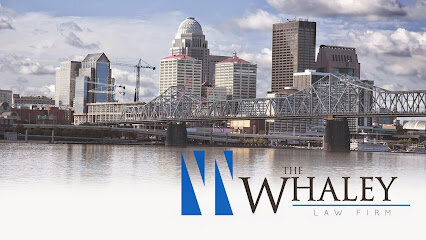Best Car Accident Lawyers in Louisville
Share your needs with us, get contacted by law firms.
Free. Takes 2 min.
List of the best lawyers in Louisville, United States
About Car Accident Law in Louisville, United States
Car accident law in Louisville combines Kentucky state traffic and civil laws with local procedures that apply in Jefferson County and the Louisville Metro area. If you are injured or your property is damaged in a crash, your legal rights and remedies generally come from state negligence law, insurance contracts, and certain municipal or state rules that affect how and when you can sue. Louisville cases are typically handled in Jefferson County state courts when lawsuits are necessary. Parallel criminal or administrative matters may arise if a driver broke traffic laws, drove under the influence, or committed other offenses.
Why You May Need a Lawyer
Many car accident claims settle without a lawyer, but there are common situations where legal help is important. A lawyer can be especially valuable if your case involves serious injuries, complicated medical treatment, permanent impairment, or high medical expenses. Attorneys assist in valuing claims, negotiating with insurance companies, and advancing claims against uninsured or underinsured drivers.
You may also need a lawyer when fault is disputed, when multiple parties are involved, when a commercial vehicle or government vehicle is at fault, or when a crash involves a hit-and-run or a rideshare driver. Lawyers help preserve evidence, prepare and file lawsuits before applicable deadlines, handle communications with insurers to avoid harmful statements, and represent you in court or mediation if necessary.
Local Laws Overview
Kentucky is a fault-based insurance state, which means the driver whose negligence caused the crash is generally responsible for paying damages. Kentucky follows a modified comparative negligence rule - your recovery can be reduced by the percentage of fault attributed to you, and in many cases you cannot recover if your fault meets or exceeds a statutory threshold. Because statutes and court interpretations change, you should consult an attorney promptly for the specific current rule and how it applies.
Key legal and practical points relevant in Louisville include the following:
- Statute of limitations: Personal injury claims arising from car accidents generally must be filed within a limited time after the crash. In Kentucky this period is relatively short for personal injury claims, so prompt action is essential to preserve your rights.
- Insurance minimums: Kentucky requires minimum liability insurance for drivers. Minimum coverage limits are set by state law and may change over time. Many drivers carry higher limits, and uninsured motorist or underinsured motorist coverage is commonly available and often recommended.
- Police reports and crash reports: If police respond to a Louisville accident, the report is useful but not binding proof of fault. You should obtain and preserve the police report and any other accident documentation.
- Special rules for government defendants: If a crash was caused by a municipality, county, or state employee, different procedural rules and shorter notice requirements can apply to claims against government entities. These claims often require timely notices and specific filing steps.
- Rideshare and commercial vehicles: Crashes involving Uber, Lyft, taxis, or commercial trucks raise special liability and insurance issues. Commercial carriers and fleet operators may carry higher insurance limits and are subject to federal and state regulations.
- Evidence preservation: Kentucky courts expect parties to preserve relevant evidence. That includes photographs, damage estimates, repair records, medical records, witness contact information, and any available video footage from traffic or business cameras.
Frequently Asked Questions
What should I do immediately after a car accident in Louisville?
Ensure everyone is safe and call 911 if there are injuries. Move to a safe location if possible, exchange contact and insurance information with other drivers, and get contact details for witnesses. Take photographs of vehicles, skid marks, road conditions, traffic signs, and injuries. Seek medical attention right away, even if you feel OK, and report the accident to your insurance company. Preserve records and consider speaking with an attorney before giving recorded statements to insurers.
Do I have to call the police after a crash?
Yes, you should call the police if there are any injuries or significant property damage. A police report documents the scene and can be helpful for insurance and legal claims. Even in minor crashes, filing a report can be useful. If police do not respond, you may need to file a crash report through the appropriate state or local office.
Who pays for my medical bills after a Louisville accident?
Responsibility depends on fault and insurance. The at-fault driver’s liability insurance should cover reasonable and necessary medical expenses caused by the crash up to policy limits. If you have personal medical coverage, health insurance may pay initial bills and then seek reimbursement from the at-fault party’s insurer. If the other driver is uninsured or underinsured, your uninsured motorist or underinsured motorist coverage may provide compensation, if you have it.
What damages can I recover in a car accident claim?
Typical compensable damages include past and future medical expenses, lost wages and lost earning capacity, property damage to your vehicle and belongings, pain and suffering, emotional distress, and in wrongful death claims, funeral and burial expenses plus loss of companionship. The exact damages available depend on the facts, your injuries, and applicable law.
How long do I have to sue after a car accident in Kentucky?
Kentucky has a statute of limitations that sets a time limit for filing personal injury lawsuits. The time allowed is limited, and missing the deadline can bar your case. Because this period is comparatively short, contact an attorney early to make sure your claim is preserved and any required filings are made on time.
What happens if the other driver does not have insurance?
If the at-fault driver is uninsured, your uninsured motorist coverage can help if you purchased it. If you do not have that coverage, recovery options may include pursuing the driver personally for damages, but collecting can be difficult if the driver lacks assets. A lawyer can evaluate your options and help with claims against other potentially responsible parties.
Will my case go to trial?
Most car accident cases settle before trial. Settlement is often faster and less costly than trial litigation. However, if the parties cannot reach a fair settlement, your attorney may file suit and proceed to trial. A lawyer will advise you on the likely outcomes, costs, and benefits of settlement versus trial in your case.
How do insurance companies value my claim?
Insurers consider medical records, treatment costs, prognosis, lost wages, property damage, fault assessments, and comparable settlements. Insurance companies also evaluate liability risks and may make low initial offers. An attorney can help gather evidence to maximize the claim value, negotiate with insurers, and explain how future medical needs and non-economic damages are factored into a fair settlement.
How long will it take to resolve my car accident claim?
Resolution time varies widely. Minor injury claims can resolve in weeks to months, while complex or catastrophic-injury cases can take many months or years, especially if litigation and trial are involved. Timing depends on medical treatment completion, negotiation, discovery, and court schedules. Your attorney can provide a realistic timeline for your specific case.
How do I choose the right car accident lawyer in Louisville?
Look for an attorney who focuses on personal injury and car accident cases, has experience in Jefferson County courts, and is willing to explain fees, strategy, and likely outcomes. Ask about contingency-fee arrangements, prior results, client references, and how the attorney communicates. Most personal injury lawyers offer free consultations, which lets you evaluate experience and comfort before hiring.
Additional Resources
Below are local and state resources that are useful when dealing with car accidents and related legal matters. Contacting the appropriate agency can help with records, insurance questions, licensing, and safety complaints:
- Louisville Metro Police Department for local crash reports and law enforcement inquiries.
- Kentucky State Police for statewide crash reports and investigations.
- Kentucky Department of Insurance for questions about coverage requirements and insurer complaints.
- Kentucky Transportation Cabinet for road conditions, maintenance concerns, and traffic engineering issues.
- Jefferson County Circuit Court and Clerk’s office for filing lawsuits and obtaining local court information.
- Louisville Bar Association and Kentucky Bar Association for lawyer referrals and attorney disciplinary records.
- Local legal aid organizations and victim assistance programs for low-cost or free help if you qualify.
- National and state traffic safety organizations for education on crash prevention and safety resources.
Next Steps
If you need legal assistance after a car accident in Louisville, consider the following steps:
- Seek medical care immediately and follow your provider’s treatment plan. Health records are critical evidence.
- Preserve all evidence from the crash scene - photos, contact information, repair estimates, medical bills, pay stubs, and any video footage.
- File or obtain the official crash report and keep copies of all correspondence with insurance companies.
- Notify your insurer as required by your policy, but consider consulting an attorney before giving recorded statements or signing releases.
- If you suspect serious injuries, significant damages, disputed liability, or claims against a government or commercial defendant, contact an experienced Louisville personal injury attorney promptly.
- When you meet with an attorney, bring your crash report, photos, medical records, insurance information, and a timeline of events. Ask about fees, expected costs, and the attorney’s approach to handling your case.
Acting promptly preserves evidence and legal options. A qualified lawyer can guide you through insurance interactions, legal deadlines, and negotiation or litigation strategies to protect your rights and pursue fair compensation.
Lawzana helps you find the best lawyers and law firms in Louisville through a curated and pre-screened list of qualified legal professionals. Our platform offers rankings and detailed profiles of attorneys and law firms, allowing you to compare based on practice areas, including Car Accident, experience, and client feedback.
Each profile includes a description of the firm's areas of practice, client reviews, team members and partners, year of establishment, spoken languages, office locations, contact information, social media presence, and any published articles or resources. Most firms on our platform speak English and are experienced in both local and international legal matters.
Get a quote from top-rated law firms in Louisville, United States — quickly, securely, and without unnecessary hassle.
Disclaimer:
The information provided on this page is for general informational purposes only and does not constitute legal advice. While we strive to ensure the accuracy and relevance of the content, legal information may change over time, and interpretations of the law can vary. You should always consult with a qualified legal professional for advice specific to your situation.
We disclaim all liability for actions taken or not taken based on the content of this page. If you believe any information is incorrect or outdated, please contact us, and we will review and update it where appropriate.









